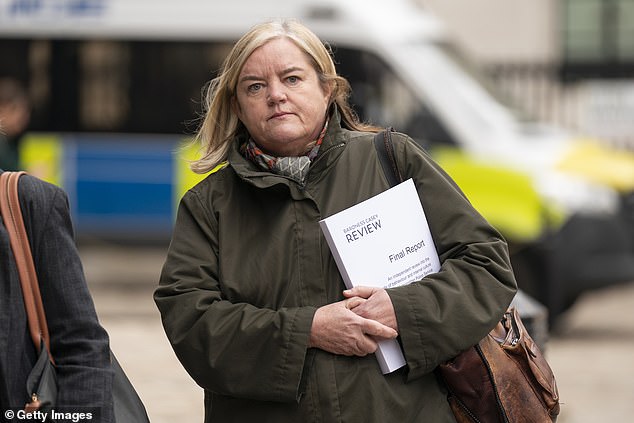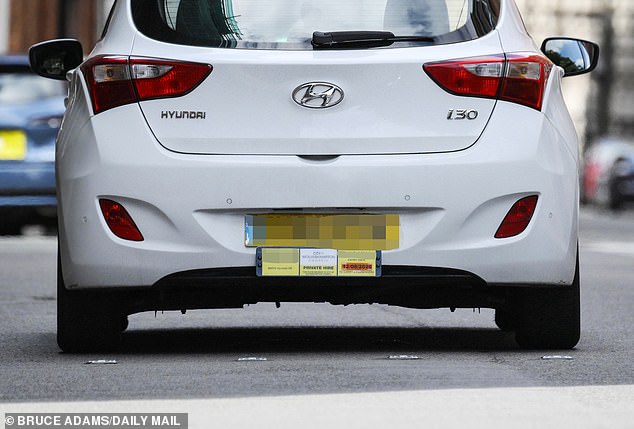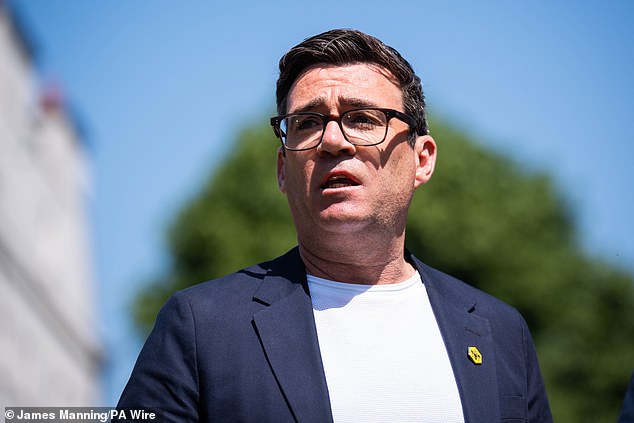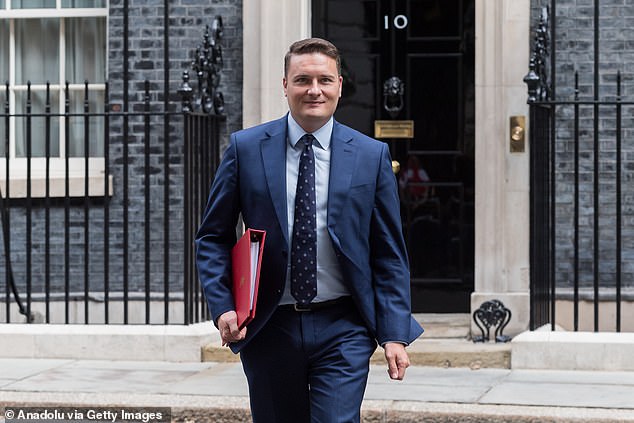Piccadilly Station in Manchester was busy last week. Travellers hurried from trains to the taxi rank at nearby Fairfield Street, where minicab drivers wait night and day for fares.
In Portsmouth, 240 miles to the south, the minicab trade was thriving too. The bustling Royal Navy seaport boasts a historic dockyard, where Admiral Nelson’s HMS Victory attracts thousands of visitors who use the same type of ‘private-licensed taxis’ to reach the 18th-century flagship from the town centre.
Yet both English cities, miles apart, have something else in common. Each is a honeypot for minicabs with badges issued by one West Midlands council: Wolverhampton.
The Mail visited Manchester and Portsmouth and in both places we photographed scores of vehicles displaying the Wolverhampton metal licences which, through a Department for Transport loophole, allow drivers to ply their trade anywhere in the country.
Near Manchester’s Piccadilly Station we photographed 30 vehicles with the Wolverhampton licences. ‘They were everywhere I went, at every taxi stand,’ said the Daily Mail photographer Bruce Adams.
In Portsmouth, it was much the same story.
Bizarre though it sounds, the drivers don’t even have to live in Wolverhampton to apply and get a badge from the city’s council, which is said to offer a quick, cheap licensing service without some of the restrictions demanded by other authorities.

In last month’s government-commissioned report into sex grooming gangs Baroness Casey of Blackstock revealed that there was a dangerous link between minicab drivers and the mass rapes of thousands of young girls
And, astonishingly, of the huge tally of 32,000 Wolverhampton licences issued in 2023 and 2024, more than 90 per cent were handed to ‘out of town’ minicabs.
So far so interesting. But in the context of last month’s devastating government-commissioned report into sex grooming gangs by Baroness Casey of Blackstock, the proliferation of Wolverhampton minicab licences across the country has terrifying implications.
For Baroness Casey revealed in her report that there was a dangerous link between minicab drivers and the mass rapes of thousands of young girls.
Indeed, she dedicated an entire chapter of her audit to minicabs, or what are officially called privately licensed taxis, saying: ‘As a key part of the night-time economy, taxis have historically been identified… as a way children can be at risk of sexual exploitation.’
She explained there were ‘many cases’ of sex grooming that highlighted links with minicabs ‘both as a potential way for the perpetrators to meet their victims, as well as a means of trafficking victims to different locations and introducing them to other perpetrators’.
In other words, minicabs are at the heart of the scandal, ferrying groomed girls all over the country via the motorway network and often in darkness to the rapists – and taking the rapists themselves to the girls.

Minicab drivers don’t even have to live in Wolverhampton to apply and get a badge from the city’s council, which is said to offer a quick, cheap licensing service without some of the restrictions demanded by other authorities
Baroness Casey went on to warn that a loophole, which allowed drivers to be licensed in one authority but operate in another, made it far more difficult for local councils to monitor minicab drivers and protect the public.
‘The Department for Transport should close this loophole immediately and introduce more rigorous standards,’ she insisted.
Yet judging by the number of Wolverhampton-licensed mini-cabs we found in Manchester and Portsmouth, the very opposite is happening.
Almost a third of all England’s licensed minicabs are registered in Wolverhampton, according to the latest figures. The council has taken on 20 extra staff to deal with the demand for its popular service, the BBC has said after investigating the issue.
This loophole was introduced in 2015 by David Cameron’s government to reduce red tape, streamline regulations and increase competition among licensing bodies while providing drivers with flexibility so there would be more taxis available.
But critics say it makes checks on rogue drivers more difficult and has created minicab mayhem. They argue the system undermines local councils’ ability to regulate who operates within their boundaries when drivers are working across multiple areas.
Greater Manchester, for instance, has been embroiled in the sex-grooming scandal – police said recently they are investigating more than 1,000 rape-gang suspects in cases thought to involve hundreds of local girls and women.
Yet figures show four in ten minicabs operating there are licensed outside the city, with many using Wolverhampton badges.
Manchester’s Labour mayor Andy Burnham warned that this makes the enforcement of taxi safety standards more difficult, and has launched a campaign calling for new legislation to stop private-hire drivers being licensed in one local area and then working in another.
Accountability to local councils is essential to public safety, he argued, adding: ‘The taxi licensing system is demonstrably broken.’

A BBC investigation found 23 allegations of child and adult sexual exploitation against Wolverhampton-licensed drivers, including in Telford, Shropshire, one of the towns where a damning report found 1,000 girl victims had been raped and abused by grooming gangs
Meanwhile, Portsmouth councillors have called for immediate action to stop the out-of-town minicabs operating there. They cited the case of a woman who this spring alleged she was sexually harassed by a driver licensed in Wolverhampton.
The woman said the male driver made sexualised remarks, delayed unlocking the door at the end of her ride, and hovered his hand over her legs as she struggled to leave his taxi during the frightening incident, which police are now investigating.
Emily Strudwick, head of Portsmouth’s taxi licensing committee, has said: ‘We’re seeing dozens of these cars [from Wolverhampton] every month. We have no enforcement power over them, and it puts the public at risk.’
The independent councillor and leader of Portsmouth’s opposition group George Madgwick went further. He warned that the lack of CCTV inside Wolverhampton-plated minicabs heightened the problem. (Portsmouth’s and nearby Southampton’s licensing conditions require CCTV to be fitted whereas Wolverhampton’s don’t.) ‘These “taxis” are flooding our city and dodging Portsmouth’s own stricter safety rules’, he explained.
Referring to the alleged assault, he added: ‘Now, yet again, a woman has been left shaken and unsafe in our streets. It’s time to say, “enough”.
‘I’m calling on the Government to close the loophole and ban out-of-area vehicles. I’m calling on you passengers, “Don’t get in a Wolverhampton-plated taxi”. Your safety is worth more than the drivers’ convenience.’
Following Baroness Casey’s report, the Government promised that the Department for Transport will tighten up the licence rules for minicab drivers to increase the safety of passengers.

Manchester’s Labour mayor Andy Burnham has launched a campaign calling for new legislation to stop private-hire drivers being licensed in one local area and then working in another
‘We will work as quickly as possible and consider all options,’ declared Transport Secretary Heidi Alexander, ‘including out-of-area working, national standards and enforcement, seeking the best overall outcome for passenger safety.’ But there have been promises before, and nothing has been done.
As far back as 2018, Wes Streeting, the current Health Secretary who was then a backbench MP for Ilford North, warned of a ticking time bomb during one of the many debates in Parliament after the minicab free-for-all was introduced.
‘On cross-border hire, local authorities in places such as Rotherham and Sheffield have had particular issues with safeguarding children and young people,’ he said.
‘Girls have been sexually assaulted and raped, and private hire vehicles [minicabs] have been used to carry out that dreadful exploitation and those horrendous crimes.
‘Where local authorities have rightly responded and put in place enhanced safety standards and protections, it cannot be right that people can flout those protections simply by getting their vehicles registered in another licensing authority, where there are lower standards. A Wild West… is where we find ourselves’.
The truth is that, since then, the bonanza in Wolverhampton minicab badges has impacted almost every town and city.
The Mail has received reports of drivers displaying the city’s plates while operating across the Midlands, in Cardiff, up in the North East in County Durham, as well as East Anglia.
Over five months last year for instance, Wolverhampton issued 8,653 licences, while just 277 were handed out in the same time frame by Birmingham, which complains it is inundated with ‘out of town’ minicabs it finds more difficult to check.
At a special council meeting to discuss the issue, Birmingham Councillor Gareth Moore said: ‘Drivers rejected for a [minicab] licence in this city have blatantly claimed they will go to Wolverhampton “because they will give me one, and I won’t have to do half the things that you are expecting me to do”.’
He called for the loophole to be shut down for the safety of passengers. Wolverhampton, meanwhile, is unrepentant. The safety of licensed minicab passengers is a number one priority, a spokesman said.
The council claims to be the only one to check drivers’ criminal records daily, and to offer passengers a smartphone service to check the name and identity of who is behind the wheel. Wolverhampton Council added: ‘It is illegal for the council to refuse applicants a taxi licence on the basis of where they live.
‘Under the current law, an unlimited number of applicants are able to apply to any council authority for a private hire licence.’ Why do drivers choose Wolverhampton where, in the year to March 2024, 96 per cent of licences were awarded to drivers outside the city?
According to an investigation by the Manchester Evening News, it is because the process is regarded by drivers as easier, quicker and cheaper than elsewhere.
The Midlands council has specialised in licensing, and made £6.1million from doing so in 2023-24, according to council records. The council insists it does not gain financially, however, as fees for licensing are ring-fenced to be spent on ‘related activities’ – which means the money goes into keeping the cost of a licence as low as possible and this in turn encourages more applicants.
Admittedly, the £49 annual driver’s fee for a private Wolverhampton licence is about to be raised to £69, but that is still lower than at most other councils. Manchester, for instance, charges £255 for a three-year licence.
There is no doubt about the safety concerns the licensing free-for-all has created. Seven long years ago, before the enormous scale of the grooming scandal became public this year, a BBC investigation raised fears of sexual predators ‘shopping around’ to find the easiest place to get a minicab licence.
It found 23 allegations of child and adult sexual exploitation against Wolverhampton-licensed drivers. They included incidents in Southampton, Derbyshire, Nottinghamshire and Telford in Shropshire, one of the towns where a damning report found 1,000 girl victims had been raped and abused by grooming gangs.

Back in 2018, Wes Streeting, the Health Secretary who was then a backbench MP, warned of a ticking time bomb during one of the many debates in Parliament after the minicab free-for-all was introduced
Of course, there have also been problems with minicab drivers licensed by other councils. Last year in County Durham’s Stockton-on-Tees, a driver lost his licence over reports that he sexually harassed and groomed a young passenger by first contacting her on social media and then offering free rides.
Police investigated but took no action. However, the town’s licensing committee said the man ‘was obstructive and uncooperative’ under questioning and often refused to attend interviews.
The licensing committee discovered the driver had been operating outside its area, in North Yorkshire’s Cleveland district, where he had made ‘sexually malicious’ phone calls. But Cleveland had failed to tell Stockton officials who, after their investigation, refused to renew the man’s licence.
In another worrying development, a Lancashire council at the heart of the child-grooming scandal handed out taxi licences to convicted offenders, including a paedophile called Moshraf Ali, who went on to be jailed for an attack on a 14-year-old girl as he drove her home at night.
And even before David Cameron relaxed the rules, official reports into sex grooming show that in 2014 Oldham approved licences for five drivers with serious criminal convictions, yet only one of them had his licence revoked.
Baroness Casey made it crystal clear last month that action must be taken to tighten up the rules. For the minicab ‘Wild West’ Wes Streeting warned of all those years ago is out of control.
An accident is waiting to happen in towns and cities all over our country – which is already steeped in shame over the gang rapes of thousands of girls.












